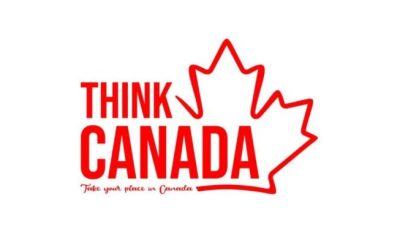Travel
Travel To Canada: The Easiest Way To Immigrate To Canada

With top-quality healthcare, a strong economy, and a diverse culture, an increasing number of expatriates and foreigners are relocating to Canada.
Canada is clean, friendly, and has a higher standard of living than many other countries.
However, before you can make the move, you must first complete the necessary procedures. Continue reading to learn everything you need to know about ways for expatriates and foreigners to immigrate to Canada.
1. Determine if You Are “Inadmissible”
Unlike several other countries, Canada has rigorous immigration regulations that govern who is allowed to enter. Before you decide to relocate there, be sure you’re qualified. Even minor offenses can make you ineligible to move to Canada.
If you have ever been convicted of a crime or committed a crime in another nation, the Canadian government may consider you inadmissible. This list includes the following offenses:
- Theft
- Assault
- Manslaughter
- Dangerous driving
- Driving under the influence of drugs or alcohol
- Possession of drugs or trafficking in controlled substances
In addition to the crimes listed above, you will also be inadmissible if you:
- Have ties to organized crime
- Have a serious health problem
- Have a serious financial problem
- Have lied in your application or interview
- Do not meet the conditions or Canada’s immigration law
- Have a family member who is not allowed into Canada
You can still apply to enter and immigrate to Canada if you have committed a crime, but you will need to do some additional measures. You will have to collaborate with an immigration official. That officer will examine the gravity of the crime, how much time has gone since the crime, and how you have behaved since.
Do you know for sure if you are eligible to enter Canada? If you’re unsure, click here for more information on determining your status.
2. Determine Which Immigration Option You Can Apply For
Once you’ve determined that you are qualified for entrance into Canada, you must decide which immigration option is best for you. You’ll need a purpose to relocate to Canada. These reasons include relocating for a new job or relocating because you have enough money to live on and do not need to work.
This excellent tool is available on the Government of Canada website to assist you in determining which immigration program you are eligible for. You’ll be asked a series of questions about your age, work intentions, and place of origin. If you answer these questions correctly, you will be sent to the program for which you can apply.
The Canadian government grants a variety of different visas, and the most popular are for skilled workers and students. You can also apply for a visa if you already have a family member living in the country. If any of these scenarios apply to you, applying for a visa should be no problem at all.
3. Choose a Province in Canada to Live In
Canada is vast. Very large. In fact, in terms of landmass, Canada ranks second only to Russia. One of the most difficult decisions to make is choose which of Canada’s ten major provinces to live in. Some provinces have distinct requirements for immigration. For example, persons wishing to relocate to Quebec might apply for a special skilled worker visa.
To select which province is best for you, consider if you want to live in a big metropolis or a rural village. Then assess the type of education your family or children require. Consider how close you want to be to other cities and towns. Consider the languages spoken in different parts of the world. Decide if you want to be in a tourist area or in a more remote location.
Every province has something different to offer, and there are lots of great locations to choose from.
4. Apply for Express Entry
The Canadian government has something called Express Entry, which is available for skilled professionals. Which immigration option you can apply for and where you intend to live will determine whether or not you are eligible for Express Entry. Express Entry is divided into three categories:
- Federal Skilled Worker Program
- Federal Skilled Trades Program
- Canadian Experience Class
Each program has its own set of requirements ranging from work experience, language ability, to education level. If you qualify for Express Entry, you will be entered into the Express Entry Pool where you can expect a much faster processing time.
5. Apply for Your Canadian Visa
You must apply once you have determined what type of visa you require. Even though Canada is one of the few countries where US residents can travel without a visa, you will need one if you plan to stay for an extended period of time. The forms demand basic information to establish your identification, as well as documents such as your passport.
If you are moving from Europe, Africa, or the Middle East, you may also need to supply biometrics such as a fingerprint and face scan.
If biometrics are required, you can do so at any visa application center. If you receive a letter from the Canadian government requesting biometrics, you can do it at application support centers in the United States. You can provide your biometrics at some visa offices throughout Europe.
6. Pass the Language Test
Depending on the type of visa and program you’re applying to, you will likely have to pass a language test before being welcomed into Canada. Primarily, Canadians speak English and French, so it’s best to be fluent in at least one of these two languages. If you speak the language it will be much easier for you to adjust and make the cultural transition.
The language test is to confirm that you can listen, speak, read, and write in one of the country’s two main languages.
7. Prepare to Move to Canada
The most difficult part of the procedure is not researching and obtaining your visa. The hard work begins once you are accepted into the nation and must begin preparing to relocate. You can’t just jump on a plane and relocate there. Before you leave, there are a few things you should do.
Before you relocate, it’s a good idea to save some money and organize your accounts. You may be required to prove your assets as part of the immigration procedure to Canada, so this is something you should not overlook. Consult a lawyer, a banker, and/or a financial consultant to decide how much money you can bring with you to Canada and what items you can bring with you to Canada and what items you can import duty-free.
Bonus – Find an International Mover
Moving all of your belongings abroad might be challenging. Hiring an international moving firm with experience in this process might be a major time saving. There are numerous firms available, and the pricing will vary depending on a variety of criteria. We’ve teamed with Sirelo to help you select an international moving company, get price estimates, and choose the best one for your needs.
Make sure you have enough money to cover your living expenses, utilities, food, and transportation. If you intend to drive, you must be able to purchase the necessary insurance. Consider all of your probable expenses and make sure you have enough money to satisfy your basic demands.
Gather all of your vital documents and keep them in a safe place as you prepare for your move. You’ll need your immigrant visa, birth certificate, and driver’s license, among other things. However, you will also require a number of other documents.
There are many documents you may not realize you need, ranging from checks to a list of personal things you wish to take with you.
It’s true that Canada has excellent healthcare, but as an expat, you may not be covered for the first several months. Don’t forget to apply for your health insurance card within your specific province.
Best Health Insurance in Canada for Expats
US Citizens: Health Insurance for Living in Canada
8. Find a Job as an Expat in Canada
Don’t wait until you’ve moved to start seeking for work in Canada. It’s usually preferable to have a job offer in hand before making an official move.
Expats from the United States will find that job hunting in Canada is fairly comparable. You can use your network of contacts, explore job boards, and reach out to companies you wish to work for just as you would in the United States. If you are not from the United States, you may wish to attend resume writing seminars and job search training programs to assist you find work.
You will need a Social Insurance Number before you can work in Canada, so apply for one as soon as you arrive.
To find a job in Canada, research the firms you wish to work for and look for open positions on their websites. Attend job fairs, get assistance from employment agencies, or use Job Bank, Canada’s online job board that posts up to 2,000 new positions every day.
Do you want to come to Canada as a skilled worker? Make sure your qualifications are evaluated to ensure your eligibility. Outside-of-Canada education, employment experience, and professional certifications must be accepted.
9. Find a Home in Canada
Even if you choose to buy a property, it is essential to find a short-term rental in Canada when you first arrive. It will take time to figure out which cities and communities are best for you and your family. With a rental, you may take your time deciding if you enjoy the region before committing to purchasing a home in that town.
The cost of living, including housing, in cities such as Toronto and Vancouver is fairly close to that in the United States. Housing prices in smaller communities might be significantly lower. Consider the various costs of living in Canada and how they can differ from one region to the next.
Regardless of where you move, here are some things you’ll need to keep in mind.
You must account for real estate agency fees, property taxes, utilities, and maintenance expenditures in addition to your monthly rent. It is critical to understand what you will and will not be held accountable for, as well as how to address conflicts if they arise. Visit the Government of Canada website for an in-depth look at everything you need to do when renting your first apartment.
10. Adjust to the Culture as an Expat
If you know you’re planning to move to Canada, it’s a good idea to do some research on the culture before you leave. Once there, you’ll be able to immerse yourself in the culture and spend your time making new friends and meeting new people.
For natives of the United States or Western Europe, Canada will not be a culture shock; everything is as you would expect from home. But that doesn’t imply there aren’t any distinctions. Canada is a varied, cosmopolitan country with a lot to offer in every field. Whether you enjoy art, music, literature, or sports, there is bound to be something to tickle your interest and keep you busy.
Do Your Homework
Canada is an excellent destination to both live and work. But, before you decide to relocate, you should conduct your research. If you have a history of crimes or convictions, the first step is to see if you are eligible.
Once you’ve determined your eligibility, look into the various forms of immigration visas. Choose the province where you want to live and see if you qualify for Express Entry. After you’ve accomplished those processes, you can apply for your visa.
When preparing to relocate, it is best to find work first. Gather all of your critical paperwork. Prepare your finances. Look for a place to live and spend some time learning about Canadian culture.
Life in Canada is similar to life in the United States and Western Europe, yet there are some differences. Canada is a popular destination for expats because to its diversified culture, pleasant climate, and great health care. It’s an excellent option for any expat wishing to relocate permanently. Do your homework before you go, and follow the necessary immigration procedures, and you’ll be sure to find a happy home in lovely Canada.
And if you really like it, you should think about becoming a permanent resident and making it official!
Bonus: How to Apply for Canada PR (Permanent Residency)
If you want to make Canada your permanent home, you’ll need to become a permanent resident.
Applying for permanent residency in Canada is a lengthy and difficult procedure. The Express Entry technique, which is intended for skilled workers, is the most prevalent application type. The Canadian government seeks people with “abilities, education, and work experience that will contribute to the Canadian economy.”
To evaluate if you have the potential to contribute, Canada uses a Comprehensive Ranking System (CRS) to grade permanent resident candidates. The CRS evaluates applications using the following criteria:
- Skills
- Education
- Language Ability
- Work Experience
- Other Factors (like having relatives in Canada)
If you perform well on the CRS examination, you have a considerably better chance of being invited to apply for permanent residency. If you are invited, you must complete the PR application, which costs $1,040. Depending on your home nation, you may also be required to supply biometric data. After everything is filed, processing can take up to 6 months.
If you are not eligible for Express Entry, there are additional options for refugees, those with family in Canada, self-employed workers, investors, caregivers, and others.






















